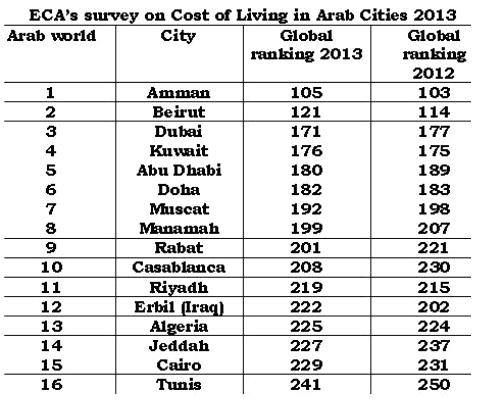Ammon News - Kuwait Times:KUWAIT: How expensive is Kuwait for expats? According to a recent survey by an independent consultancy group Kuwait is the second most expensive city in the Arabian Gulf and the fourth in the Arab world. The poll conducted by ECA International provider of knowledge, information and technology for the management and assignment of employees across the globe and which was released last week, showed that globally Dubai ranks 171st and Abu Dhabi is placed at the 181st† position in the survey which included 440 cities.
The survey found that the Venezuelan capital, Caracas, is currently the most expensive place in the world for expatriates. Luanda, a city in Angola was ranked in the second place and Norway’s capital Oslo in the third place. South Sudan’s Juba was ranked fourth in the list while Norway’s Stavanger was placed in the fifth position. Caracas is now the most expensive city in the world after seeing inflation of 30-40 percent in the last six months.
However, this may be a short-lived title as pressure is building on the currency and a devaluation is likely in the near future. Tokyo, which topped the list last year, dropped to tenth place on the back of a softer Yen. Tokyo and Beijing are now the most expensive Asian cities for expatriate staff in live in, according to the survey. While Tokyo is still Asiaís most expensive city for expatriates, globally it fell to 10th place from last year when it was number one in the world. The is due to a weaker Yen. Beijing rose to number two in Asia, up from fifth place last year. It is now 15th globally. Despite being named one of the five priciest cities in the world, Sydney weighs in at 31 ñ making it cheaper for expats than Moscow (12), Beijing (15) or Port Moresby (25).
Falling currencies
Australia, Brazil, Ghana, India, Indonesia, Mongolia, Myanmar, Papua New Guinea, Paraguay, South Africa, Turkey and Uruguay: since ECAís cost of living survey undertaken in March all of these countries have seen significant falls in the exchange rates against other major currencies such as the EUR, GBP and USD. This means that indices are likely to be lower for assignees going to these countries and higher for those leaving these countries. For example, the index for an assignee going from the UK to Australia on a Standard Home Base (SHB) fell 15% between this yearís March and September surveys while that of a Brazilian assignee going to the USA went up 14% over the same period. Lesotho, Namibia and Swaziland where the currencies are tied to the South African rand have also seen significant changes. According to the survey, the ‘official’ exchange rate in Iran, the Iranian Rial Rate (IRR), has halved in value. However, the floating rate, which is considered to best reflect the rate used by assignees, has actually strengthened a little since March against the GBP and other major currencies. Sudan is still suffering from high inflation though there are signs that it has slowed a little. Prices of items in ECAís cost of living basket for the last six months have gone up 15% compared to over 30 percent for the previous six months. ECA’s cost of living calculator enables subscribers to come up with net adjustments intended to preserve employees’ purchasing power abroad.
By Lulwa Enezi
